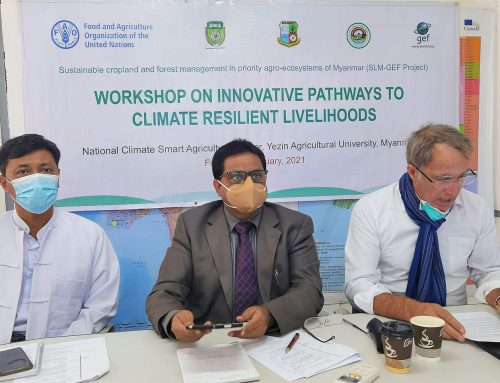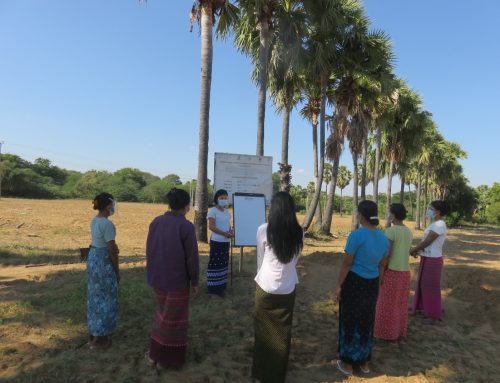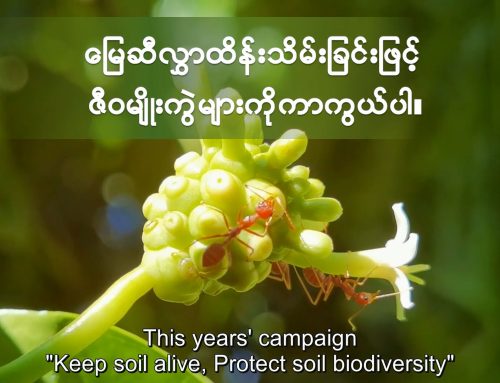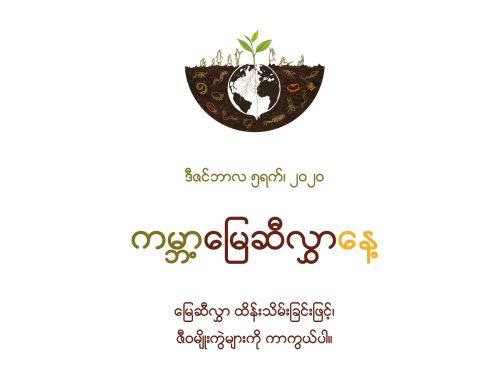
FAO has been implementing a Global Environment Facility (GEF) funded five years project entitled “Sustainable cropland and forest management in priority agro-ecosystems of Myanmar” since July 2016 in coordination with the Ministry of Natural Resources and Environmental Conservation (MoNREC) and the Ministry of Agriculture, Livestock, and Irrigation (MoALI). In the field, the project is promoting various relevant climate smart agricultural techniques and practices mainly using Farmer Field Schools (FFS) models in the five pilot Townships from three different agro-ecological zones: i) Upland/hill Pilot Site: Mindat and Kanpetlet Townships, Chin State; ii) Coastal/Delta Zone Pilot Site: Laputta Township, Ayeyarwady Region and iii) Central Dry Zone Pilot Site: Kyaukpadaung and Nyaung U Townships, Mandalay Region. In order to identify the crops and cropping systems to be included in the FFS, FAO conducted prioritization of crops, value chain assessment, market assessment, need assessment, development of FFS Curriculum and developing three FFS Handbooks for three agro-ecological zones with support from AVSI Foundation as a Service Provider.

The first phase implementation of 16 FFSs in 13 villages on chickpea, green gram and sesame crops involving 336 households was completed in April 2018 in Central Dry Zone (Nyaung-U and Kyaukpadaung Townships). Additional 55 FFSs involving 1,650 farming households were established in April/May 2018 in 55 villages of five pilot Townships of the project under three agro-ecological zones with support from COLDA (in Upland/hills zone), Cesvi Myanmar (in Central Dry zone) and AVSI (in Coastal/Delta zone) and DoA Offices in respective District and Township. Before the implementation of FFS, FAO also organised a Training of Trainer (ToT) programme on CSA and FFS in three pilot sites (Mindat, Nyaung-U and Labutta) for the representatives from respective District/Township DoA Offices and from Service Providers.
At the end of the FFS i.e. before the harvesting of the crop, a Farmer Field Day (FFD) is organized at each FFS site where the FFS farmers present and discuss all the activities and achievements to the local community members (from within the village and from neighboring villages), government agriculture workers and other concerned stakeholders. Accordingly, the Project team recently participated in a FFD organized at a FFS site n Sit Kwe Village of Labutta Township on 21 Nov 2018 where a demonstration plot was established to demonstrate on System of Rice Intensification (SRI) together with several other CSA techniques. There is a FFS Committee established with a total of 30 farmers and all the farmers have planted paddy seeds provided by FAO, using CSA techniques.

A total of 110 community members (10 female and 100 male) and 19 representatives from DoA, FAO, RECOFTC, AVSI, FD, GAD and a Police Officer attended the FFD event. The opening remarks made by Township Officer from DoA and International Climate Smart Agriculture Specialist from FAO highlighted the overall objectives of the FFS implementation, the importance of promoting climate smart agriculture, roles and responsibilities of various parties involved in FFS activities and also thanked the community and all concerned for their active participation and contributions. The Country Director of AVSI Foundation welcomed all the participants and presented the agenda of the FFD event. The FFS Committee shared all the activities, the process adopted in FFS implementation, learnings and achievements. During the FFD celebration, practical demonstrations were made by FFS Committee and DoA staff on making of Fish Amino Acid (FAA), making of Indigenous Micro Organism (IMO), use of Effective Micro-organism (EM) Solution, establishment of vermiculture unit, compost making, use of light trap, harvesting of paddy sample plots and some data collection, threshing of harvested paddy and planting of the green gram after harvesting of paddy. Farmers were very much impressed by the SRI method and other CSA techniques and showed a great interest and commitment to replicate in wider areas in the coming monsoon season. The FFD event ended with the distribution of green gram seeds, rhizobium packets and air-tight bags for seed storage, to all the 30 members of the FFS committee and congratulating the entire FFS Committee for their achievements.





